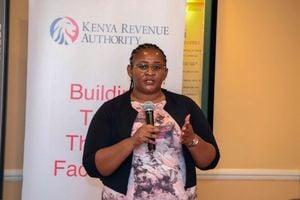Why MPs want journalists out of the way

National Assembly Speaker Justin Muturi.
What you need to know:
- The move orchestrated by the political side of the House in the House Business Committee – initiated by the Deputy Minority Leader Jakoyo Midiwo and backed by the Speaker Muturi and the Leader of Majority Aden Duale – caught many in the administrative side unawares.
The decision of the National Assembly Speaker Justin Muturi to restrict parliamentary journalists to the press gallery is seen as part of a plan to ensure the public gets little or no information about the silent schemes that are hatched away from the debating chamber and the committee rooms.
The move comes with just three weeks left to the end of the financial year, and on the week that MPs are scheduled to debate and approve the Sh1.6 trillion budget for the next financial year.
MPs are also scheming on ways to ensure that whatever agreement they reach with the Salaries and Remuneration Commission is included in the budget.
The move orchestrated by the political side of the House in the House Business Committee – initiated by the Deputy Minority Leader Jakoyo Midiwo and backed by the Speaker Muturi and the Leader of Majority Aden Duale – caught many in the administrative side unawares.
MPs want journalists out of the precincts of Parliament because, they say, the coverage of the salaries debacle and the shoddy job of vetting by the lawmakers had cast the House in negative light, and they thought the House “needed a break” from the coverage.
“There’s a day I was watching news with my children. You people called me a pig! Do you know we have relatives, friends, and families,” an MP, whose name had been painted on a pig in the protest against a pay rise, told journalists in Parliament as they petitioned him to intervene and have the Speaker rescind the decision.
The journalists responded: “We did not call you a pig. We just showed the pigs and the names that the activists had painted on the pigs. Unfortunately your name was there, and there’s nothing we could do about it. We reported what happened!”
Others like Mr Midiwo were unapologetic when they met journalists in Parliament.
“You are the Fourth Estate. Don’t forget that you are not part of Parliament. This is a House of order. It is not for journalists. Mkae huko nje. MPs cannot lack a place to do their job, while you are comfortable doing yours within the buildings of Parliament. Parliament is for MPs, not journalists,” said Mr Midiwo.
The decision about infrastructure and space for committees is the exclusive mandate of the Parliamentary Service Commission. The PSC is chaired by the Speaker of the National Assembly who has the responsibility to defend and affirm its supremacy.
But to circumvent the PSC in undoing the reforms instituted by his predecessor may not augur well with the administrators, considering the thought and effort put into developing the plan for the House.
It was a commission decision – after a petition by the Kenya Parliamentary Journalists Association – to have a media centre within the precincts of the Parliament Buildings to ensure that MPs had easy access to journalists and that journalists, too, could access MPs without much difficulty.
Many of the senior administrators in the National Assembly were taken aback when they were told that the media centre had to be closed. They had no idea why the House Business Committee was revising the 10-year plan (Strategic Plan 2008-2018) of the National Assembly, whose sole aim was to take Parliament closer to the people.
The media centre was built using part of the Sh560 million donation to Parliament by the US Agency for International Development.
The money was used to train MPs, parliamentary staff and journalists; install infrastructure for live broadcast, and pay the Kenya Broadcasting Corporation for airing live parliamentary sessions; build the media centre; and also to pay over 100 interns.
Some members of the PSC and MPs who served in the last Parliament have taken issue with the order. They told the Nation in separate interviews that the closure of the media centre, ostensibly because of space constraints, was ill-informed.
“Even in the Tenth Parliament, we used to meet in the media centre, in the room used by MPs to hold press conferences.
The room used by journalists to do their job cannot and should not be touched,” said Mr John Mbadi (Suba), shortly after he had asked the Speaker where MPs will be meeting journalists, if the media centre is closed.
The Clerk, Mr Justin Bundi, was under pressure to ensure that the directive was implemented.
No recording equipment is allowed in the Press Gallery. Journalists are only allowed to carry a notebook and a pen.
“Think of it as a highrise building whose lifts have been removed. You can still use the staircase to the 32nd floor … we will still do our work, but it will be extremely difficult,” said Mr John Ngirachu, a parliamentary journalist with the Nation Media Group.
The order to convert the media centre into committee rooms means that journalists will now have to depend on the parliamentary Hansard for records.
It also means that a parallel recording of the live proceedings will be impossible in instances – and there have been many of late – when the live feed by the Parliamentary Broadcasting Unit fails.
The leadership in Parliament is scheduled to meet the Media Council of Kenya to discuss the closure of the media centre, among other issues, on Tuesday.
The PSC, too, is looking for alternative space for journalists – a place that can be easily accessed by journalists and one that can also be accessed by MPs.




